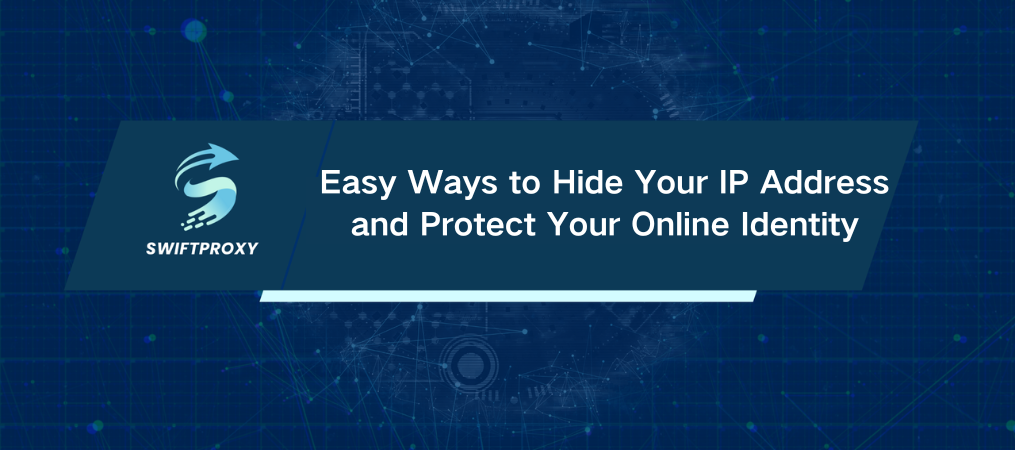Easy Ways to Hide Your IP Address and Protect Your Online Identity

Every time you connect to the internet, your device is given a unique identifier – your IP address. It's like your home address in the digital world, enabling communication between devices. But here's the catch: just like your physical address, your IP can be used to track you, compromise your security, and even block access to certain content.
It's easy to assume that hiding your IP address is unnecessary. After all, you're not doing anything shady, right? Well, the truth is, your IP says a lot more about you than you might think. It reveals your physical location, browsing habits, and even your identity. That's why keeping it private should be part of your digital hygiene.
Introduction to IP Address
Think of an IP address as the digital equivalent of your home address. Just like how the post office uses your physical address to deliver mail, your IP address helps route your internet data. Every time you visit a website or stream a movie, your device's IP is what makes that communication possible.
There are two main types of IP addresses: public and private. Public IPs are the ones that identify you on the internet, assigned by your ISP. Private IPs, on the other hand, are used within your own network, like at home, and don't directly expose you to the internet.
Why Should You Hide Your IP Address
Now, you might be thinking, Why bother hiding something so seemingly innocuous? The truth is, there are several key reasons to keep your IP under wraps:
1. Security: An exposed IP address is an open door for cyberattacks. Hackers can track your every move, potentially accessing personal data or launching attacks like DDoS or phishing.
2. Privacy: Advertisers track your online behavior using your IP. The more they know about you, the more they can target you with annoying, and often intrusive, ads. Not to mention, your IP can reveal your physical location, which is something you might want to keep private.
3. Accessing Restricted Content: Many websites restrict content based on your location. Whether it's streaming services or news sites, your IP can be used to block or limit what you can access. Changing your IP lets you bypass these restrictions and unlock the internet the way you want to.
4. Bypassing Censorship: If you're in a region with internet censorship, your IP can be used to block you from accessing certain websites. Changing your IP address lets you get around this and access the open web.
The Ways to Hide Your IP Address Today
Now, let's get practical. If you're serious about protecting your privacy and enhancing your online security, here are some ways to hide your IP address that anyone can use—no tech expertise required.
1. Utilize a Proxy Server
Proxy servers act as intermediaries between you and the internet. When you use one, your device connects to the web via the proxy, which masks your real IP address. Proxies don't encrypt your traffic, but they can be faster, making them ideal for accessing restricted content quickly.
Benefits:
· Fast and simple to set up.
· Bypass geographical restrictions easily.
· More affordable than other options.
If you're just looking to access a blocked site or change your location without needing full encryption, a proxy can be a great option.
2. Utilize the Tor Browser
The Tor Browser is built for privacy. When you use Tor, your data is routed through multiple layers of encryption across a network of volunteer-run servers. This makes it nearly impossible to trace your IP address. Tor is a great choice for sensitive browsing, but it can be slow, so it's not ideal for streaming.
Benefits:
· Maximum anonymity and privacy.
· Access the dark web.
· Free to use.
Tor is a powerful tool for activists, journalists, and anyone who needs ultimate privacy, but be prepared for slower speeds.
3. Access Public Wi-Fi
When you connect to public Wi-Fi, like at a coffee shop or library, your device uses the IP address assigned by the network, not your home IP. This is a quick and easy way to mask your location, but it comes with risks. Public Wi-Fi is generally unsecured, so it's not the best solution for sensitive activities.
Benefits:
· No setup required.
· Quickly mask your IP for casual browsing.
While it's a fast fix, remember that public Wi-Fi isn't a secure environment, so avoid logging into sensitive accounts or making financial transactions.
4. Utilize Mobile Network
If you need a quick and easy way to hide your IP, try using your mobile data. Whether it's 4G or 5G, your mobile carrier will assign you a different IP address, which hides your home IP from websites. This is great for short-term use, especially when traveling.
Benefits:
· Convenient and easy to use.
· Works when you don't have access to Wi-Fi.
Just be mindful of your mobile data limits and the fact that using mobile networks doesn't offer the same level of encryption.
Conclusion
The method you choose depends on your needs. For quick, casual IP masking, proxy servers or public Wi-Fi might be enough. If you're looking for ultimate anonymity, Tor should be your go-to, but be ready for slower speeds. Remember, no single solution works for everyone. The key is to choose the method that fits your needs and balances privacy, security, and convenience.
Your IP address doesn't have to be a liability. By using the right tools, you can protect your identity, access the content you want, and enjoy the internet without worrying about being tracked or censored.

















































